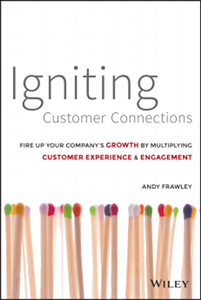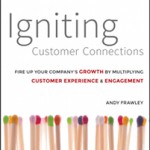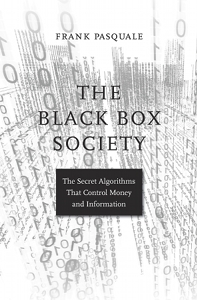Posted by Elena del Valle on February 27, 2015

Igniting Customer Connections
Photos: Wiley
Andrew Frawley, president, Epsilon, has 30 years of marketing experience. He is convinced the old methods of marketing are behind us. He seeks to establish an emotional connection with customers and engage with them in “effective ways that achieve impressive repeatable results.”
Toward that goal he commissioned proprietary research.
The findings lead to what he calls Return on Experience x Engagement or ROE 2, an approach to produce profitable customer connections and measure marketing results. In Igniting Customer Connections: Fire Up Your Company’s Growth By Multiplying Customer Experience & Engagement by Frawley (Wiley, $28), published October 2014, he describes his ideas about marketing to build connections to match today’s technology and consumers.

Andy Frawley, author, Igniting Customer Connections
The 240-page hardcover book is divided into 21 chapters and three main sections. Part one, Connect with Your Customers Now, explains the approach and how it differs from the traditional return on investment concept. In ROE 2 Research and Insights he explains how it works, illustrating the research and interviews with executives. In An ROE 2 Primer, the third section, he discusses content, channels, measurement and segmentation, and technology as well as consumer privacy issues.
He believes marketers will require new analytical skills to take advantage of Big Data as the depth and breath of information expands. When it comes to consumer privacy, he suggests intelligent anonymity where a marketer has extensive information about a consumer without knowing who he or she is. He indicates in the book that best in class marketers don’t associate consumers’ individual information with cookies, and ensure consumer data remains only within the client’s possession. He proposes in Chapter 20 that marketers address consumer privacy with “transparency, knowledge, respect and responsibility.”

Click to buy Igniting Customer Connections
Comments:
Filed Under: Books
Posted by Elena del Valle on February 20, 2015

The Black Box Society
Photos: Harvard University Press
Every day, a corporate or government system gathers data, openly and in secret, about people across America. From purchasing habits to driving our lives and movements physical and virtual are increasingly subject to voyeurism, storage, sharing and analysis without our consent or knowledge. In The Black Box The Secret Algorithms That Control Money and Information (Harvard University Press, $31.50) Frank Pasquale, professor of law, University of Maryland, explores issues related to corporate data gathering, and asks who tracks the activities of the data gatherers, their own data; and what happens to the data they gather about us.
He points to the proprietary methods, gag rules and nondisclosure agreements government agents and corporations hide with, leaving everyone else exposed. Using anonymizing software, he says, may draw unwanted attention from authorities. The same laws that aggressively protect the data gatherers’ secrecy is “increasingly silent when it comes to the privacy of persons,” he says in the book.
“Many of the firms I write about in the book try very hard to keep their practices secret. I had to comb many reports in order to find another leaks, litigation documents, and other ‘peeks’ inside their black boxes,” said Pasquale when asked by email about the biggest challenge the book presented for him.

Frank Pasquale, author, The Black Box Society
“I have heard from so many people who’ve been victimized by black box processes,” he said, when asked what was the most unexpected result of writing and publishing the book. “There was a man who found his credit damaged for years, because he lost one small stage of a lawsuit against an obviously fraudulent actor. There are people who can’t find jobs because some mysterious algorithm or reporting system keeps blackballing them. But there are also many who fight back, and I really find inspiration from their stories.”
In the book, he asks: Should our own citizens be on secret watchlists without their knowledge or any opportunity to defend themselves? Should a credit card company be entitled to raise the interest rate of a couple seeking marriage counseling? Should they be told? Should powerful search engines and social media sites be entitled to take down legal websites and books without informing the public? Should the Federal Reserve print money to save banks after their executives behave irresponsibly, and hide the printing from the public?
The 304-page hardcover book, published this year, is divided into six chapters: Introduction—The Need to Know, Digital Reputation in an Era of Runaway Data, The Hidden Logics of Search, Finance’s Algorithms: The Emperor’s New Codes, Watching (and Improving) the Watcher, and Toward an Intelligible Society. It features 83 pages of end notes.
To the question of what the average person can do to protect her or himself until, and if, the situation is remedied, and the transparency you call for becomes a reality? he replied, “I’d say: support smaller, more local economic actors. At least there are people at them who can respond to complaints and try to fix things. I’ve found that, at many large firms, algorithmic processes truly become faceless…there’s no one to appeal to.”
In closing he says, the data gathering situation and society with a black box approach “has become dangerously unstable, unfair and unproductive;” and that it is up to society to establish the rules that lead us to a safe environment and a stable economy. Pasquale is an affiliate fellow at Yale Law School’s Information Society Project, and a member of the Council for Big Data, Ethics, and Society.

Click to buy The Black Box Society
Comments:
Filed Under: Books
Posted by Elena del Valle on February 11, 2015
April Davis
Founder
Cupid’s Cronies

April Davis, founder, Cupid’s Cronies
Photo: Cupid’s Cronies
Being a successful businessperson and being a successful dater may seem completely unrelated. However, many of the skills and techniques used in dating can be applied to a business context. As a dating coach, I provide our clients with various tips on building a relationship, conversing, and making connections, just a few of the tips that can overlap with the business world. Here are five examples.
Conversation and communication skills
We’ve all been in meetings when afterwards you talk later and it’s clear you heard different messages. Similarly, two people can go on a date and when they follow up with me, I hear two distinctly different versions of the event.
In order to have a good meeting or a good date, one needs to have great communication skills. If they’re awkward in their delivery or lack decent grammar, they’re going to be quickly written off and disregarded.
Click to read the entire article Business tips from a dating coach
Posted by Elena del Valle on February 4, 2015
By Danixa Lopez
Senior account executive
Santa Cruz Communications

Danixa Lopez, senior account executive, Santa Cruz Communications
Photo: Santa Cruz Communications
I recently performed a Google search for the keyword phrase of Public Relations for the Hispanic Market and more than 1.5 million results were produced. With so many options, how can public relations and marketing agencies that offer services tailored to the Hispanic market differentiate themselves?
There is no correct answer. When it comes to marketing to Hispanics, each public relations professional has his/her own experience and strengths that can help when developing and executing a media relations plan. There is a myriad of proven strategies and tactics that you can use. However, no matter which ones you choose, there are some basic practices that will help you and your team obtain the best results.
Click to read the entire article Five proven practices to obtain the best results out of your media relations plan

















